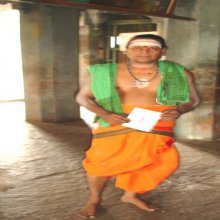Masi, Mashi, Maṣi, Masī: 25 definitions
Introduction:
Masi means something in Hinduism, Sanskrit, Jainism, Prakrit, Buddhism, Pali, the history of ancient India, Marathi, Hindi, biology, Tamil. If you want to know the exact meaning, history, etymology or English translation of this term then check out the descriptions on this page. Add your comment or reference to a book if you want to contribute to this summary article.
The Sanskrit term Maṣi can be transliterated into English as Masi or Mashi, using the IAST transliteration scheme (?).
Images (photo gallery)
In Hinduism
Vyakarana (Sanskrit grammar)
Source: Wikisource: A dictionary of Sanskrit grammarMasi (मसि).—Personal ending formed by adding इ (i) to मस् (mas) of the 1st person (उत्तमपुरुष (uttamapuruṣa)) pl. in Vedic Literature दीपयामसि, भजयामसि (dīpayāmasi, bhajayāmasi), cf. Kāś. on इदन्तो मसि (idanto masi) P.VII.1.46.

Vyakarana (व्याकरण, vyākaraṇa) refers to Sanskrit grammar and represents one of the six additional sciences (vedanga) to be studied along with the Vedas. Vyakarana concerns itself with the rules of Sanskrit grammar and linguistic analysis in order to establish the correct context of words and sentences.
Ayurveda (science of life)
Source: gurumukhi.ru: Ayurveda glossary of termsMaśī (मशी):—The materials are subjected to heat in a closed vessel to obtain black form of ash

Āyurveda (आयुर्वेद, ayurveda) is a branch of Indian science dealing with medicine, herbalism, taxology, anatomy, surgery, alchemy and related topics. Traditional practice of Āyurveda in ancient India dates back to at least the first millenium BC. Literature is commonly written in Sanskrit using various poetic metres.
In Jainism
General definition (in Jainism)
Source: HereNow4u: Lord VṛṣabhanāthaMasi (मसि, “writing”).—Having set up a system of law and order and prevention of crime, king Vṛṣabhanātha made a plan for his subjects to become self-sufficient in the affairs of the karmabhūmi (the mundane world of action). For the welfare of subjects he trained them in asi (art of government / military occupation), masi (writing) and kṛṣi (farming) and a hundred crafts.
He taught asi, masi and kṛṣi to the human society, thus saving them from consuming the inedible / inconsumable, leading a sātvika (pure) life and explained to them that if necessity led them to take up a faulty vocation, in that case, knowing it to be sin, their aim should be to move towards a virtuous life this was indeed samyak-darśana (right view of reality / true spiritual path).
Source: Encyclopedia of Jainism: Tattvartha Sutra 3: The Lower and middle worldsMasi (मसि, “accounting”) refers to “professional and accounting” and represents a type of “civilized people who indulge in activities with attachment” (sāvadhyakarma-ārya), which itself is a division of karmārya: one of the classes of āryas without extraordinary powers (ṛddhi). These Ārya (civilized people) represent one of the two classes of human beings, according to the 2nd-century Tattvārthasūtra 3.46. What is meant by professional and accounting (masi) activities? To develop expertise in accounting of exchange of goods for trade is called accounting / professional (masi) activities.

Jainism is an Indian religion of Dharma whose doctrine revolves around harmlessness (ahimsa) towards every living being. The two major branches (Digambara and Svetambara) of Jainism stimulate self-control (or, shramana, ‘self-reliance’) and spiritual development through a path of peace for the soul to progess to the ultimate goal.
India history and geography
Source: Shodhganga: A translation of Jhaverchand Meghanis non translated folk talesMasi refers to “Mother‘s sister”.—It is defined in the glossary attached to the study dealing with Gujarat Folk tales composed by Gujarati poet Jhaverchand Meghani (1896-1947)

The history of India traces the identification of countries, villages, towns and other regions of India, as well as mythology, zoology, royal dynasties, rulers, tribes, local festivities and traditions and regional languages. Ancient India enjoyed religious freedom and encourages the path of Dharma, a concept common to Buddhism, Hinduism, and Jainism.
Biology (plants and animals)
Source: Wisdom Library: Local Names of Plants and DrugsMasi [मसी] in the Hindi language is the name of a plant identified with Dicliptera paniculata (Forssk.) I.Darbysh. from the Acanthaceae (Acanthus) family having the following synonyms: Dianthera paniculata, Peristrophe paniculata. For the possible medicinal usage of masi, you can check this page for potential sources and references, although be aware that any some or none of the side-effects may not be mentioned here, wether they be harmful or beneficial to health.
Source: Google Books: CRC World Dictionary (Regional names)1) Masi in India is the name of a plant defined with Chloroxylon faho in various botanical sources. This page contains potential references in Ayurveda, modern medicine, and other folk traditions or local practices It has the synonym Swietenia chloroxylon Roxburgh (among others).
2) Masi is also identified with Daemia extensa It has the synonym Doemia extensa R. Br. (etc.).
3) Masi is also identified with Pergularia daemia It has the synonym Asclepias scandens P. Beauv. (etc.).
4) Masi is also identified with Valeriana jatamansi It has the synonym Valeriana harmsii Graebn. (etc.).
Example references for further research on medicinal uses or toxicity (see latin names for full list):
· Flora Capensis (1908)
· Miscellanea Austriaca ad Botanicam, Chemiam, et Historiam Naturalem Spectantia (1781)
· Systema Vegetabilium (1820)
· Prodromus Systematis Naturalis Regni Vegetabilis (1830)
· Resultati Scientifi ci della Missione Stefanini-Paoli nella Somalia Italiana (1916)
· Proceedings of the Indian Science Congress Association (1980)
If you are looking for specific details regarding Masi, for example health benefits, pregnancy safety, diet and recipes, side effects, extract dosage, chemical composition, have a look at these references.

This sections includes definitions from the five kingdoms of living things: Animals, Plants, Fungi, Protists and Monera. It will include both the official binomial nomenclature (scientific names usually in Latin) as well as regional spellings and variants.
Languages of India and abroad
Pali-English dictionary
Source: BuddhaSasana: Concise Pali-English Dictionarymasi : (m.) soot; charcoal dust.

Pali is the language of the Tipiṭaka, which is the sacred canon of Theravāda Buddhism and contains much of the Buddha’s speech. Closeley related to Sanskrit, both languages are used interchangeably between religions.
Marathi-English dictionary
Source: DDSA: The Molesworth Marathi and English Dictionarymaśī (मशी).—f See under maṣī.
--- OR ---
maṣī (मषी).—f S pop. maśī f The black or soot of culinary vessels, crock: also soot in general, smut, lampblack &c. 2 The black residue of burned cloth, paper &c.
--- OR ---
māśī (माशी).—f (makṣikā S) A fly. 2 The bead or sight of a gun. māśā khāṇēṃ -giḷaṇēṃ (To eat flies.) To look silly, confounded, disconcerted &c.: also to dawdle, loiter, poke. māśā mārīta basaṇēṃ or māraṇēṃ To be without employment or occupation. māśī lāgaṇēṃ (ḍāgiṇyā- lā &c.) Said of a trinket of which the gilding is anywhere worn off. māśī śiṅkaṇēṃ (To sneeze--a fly.) Used in accounting for or noticing a loss or other evil occurrence.
--- OR ---
māśī (माशी).—f māśīcēṃ jhāḍa n A shrub the leaves of which are used to blister. It is of the class Justicia, and bears a very small (fly-like) flower.
--- OR ---
māśī (माशी).—a Relating to the weight māsā. Used in comp. with the numerals; as ēkamāśī, dumāśī, timāśī, caumāśī.
Source: DDSA: The Aryabhusan school dictionary, Marathi-Englishmaṣī (मषी) [-sī, -सी].—f The black or soot of culinary vessels, crock. Ink.
--- OR ---
māśī (माशी).—f A fly. The bead or sight of a gun. māśā mārata basaṇēṃ Be without oc- cupation.
Marathi is an Indo-European language having over 70 million native speakers people in (predominantly) Maharashtra India. Marathi, like many other Indo-Aryan languages, evolved from early forms of Prakrit, which itself is a subset of Sanskrit, one of the most ancient languages of the world.
Sanskrit dictionary
Source: DDSA: The practical Sanskrit-English dictionaryMaśī (मशी).—See मसी (masī).
--- OR ---
Maṣi (मषि) or Maṣī (मषी).—f. = मसी (masī) q. v.
Derivable forms: maṣiḥ (मषिः).
--- OR ---
Masi (मसि).—m. f.
1) Ink.
2) Lampblack, soot.
3) A black powder used to paint the eyes; अस्रैरुपात्तमषिभिः कुचकुङ्कु- मानि (asrairupāttamaṣibhiḥ kucakuṅku- māni) (mṛjantyaḥ) Bhāgavata 1.29.29.
Derivable forms: masiḥ (मसिः).
--- OR ---
Masī (मसी).—See मसि (masi) above.
Source: Cologne Digital Sanskrit Dictionaries: Edgerton Buddhist Hybrid Sanskrit DictionaryMaśī (मशी).—or (Mironov) maśi, f. (= Sanskrit maṣi, see below), probably soot, but according to Tibetan (du ba) and Chin. on Mahāvyutpatti smoke: maśīr (Mir. maśir) api na prajñāyate Mahāvyutpatti 5254, followed by chāyikam (q.v.) api…; in same context spelled maṣi (= Sanskrit, and Pali masi); (of the earth, burned by fire) maṣir api an prajñāyate, tad yathāpi nāma sarpiṣo vā tailasya vāgninā dahyamānasya na maṣir na chāyikā prajñāyate…Śikṣāsamuccaya 246.9—11; similarly Mahāvastu ii.325.9, on which see chāyikā. (Both edd. of Mahāvyutpatti cite v.l. maśiram.)
Source: Cologne Digital Sanskrit Dictionaries: Shabda-Sagara Sanskrit-English DictionaryMaṣi (मषि).—f. (-ṣiḥ-ṣī) 1. Ink. 2. The stalk of the Nyctanthes tristis. E. maṣ to hurt, in aff.; also maśi or masi .
--- OR ---
Masi (मसि).—mf. (-siḥ-sī) 1. Ink. 2. The stalk of the Nyctanthes tristis. 3. Lamp-black. 4. A black powder used as a collyrium. E. mas to weigh, Unadi aff. in; it also occurs, maśi, maśī, maṣi and maṣī .
Source: Cologne Digital Sanskrit Dictionaries: Benfey Sanskrit-English DictionaryMasi (मसि).—masī, see maṣi.
Source: Cologne Digital Sanskrit Dictionaries: Cappeller Sanskrit-English DictionaryMaṣi (मषि).—[feminine] powder, [especially] bone-black, ink.
--- OR ---
Maṣī (मषी).—[feminine] powder, [especially] bone-black, ink.
--- OR ---
Masi (मसि).—[feminine] = maṣi & maṣī.
--- OR ---
Masī (मसी).—[feminine] = maṣi & maṣī.
Source: Cologne Digital Sanskrit Dictionaries: Monier-Williams Sanskrit-English Dictionary1) Maṣi (मषि):—[from maṣ] mf. (or f(ṣī). ; cf. below) powder, ([especially]) a black p° used to paint the eyes, soot, lampblack, ink, [Kāvya literature; Varāha-mihira; Suśruta etc.]
2) Maṣī (मषी):—[from maṣ] (= maṣi), in [compound]
3) Masi (मसि):—and masī, incorrectly for maṣi and maṣī q.v. (masī-√bhū, to become black, [Śiśupāla-vadha xx, 63]; cf. maṣī-bhāvuka)
4) Masī (मसी):—[from masi] f. the stalk of the Nyctanthes Arbor Tristis, [cf. Lexicographers, esp. such as amarasiṃha, halāyudha, hemacandra, etc.]
5) Māṣī (माषी):—[from māṣa] a f. See below.
6) Māṣi (माषि):—[from māṣa] m. [patronymic] [from] māṣa [gana] bāhv-ādi (cf. māṣa-śarāvi).
7) Māṣī (माषी):—[from māṣa] b f. Name of the wife of Śūra, [Viṣṇu-purāṇa]
Source: Cologne Digital Sanskrit Dictionaries: Yates Sanskrit-English Dictionary1) Maṣi (मषि):—[(ṣiḥ-ṣī)] 2. f. Ink; the stalk of the Nyctanthes tristis.
2) Masi (मसि):—[(si-sī)] 1. m. f. Ink; the stalk of the Nyctanthes tristis.
Source: DDSA: Paia-sadda-mahannavo; a comprehensive Prakrit Hindi dictionary (S)Masi (मसि) in the Sanskrit language is related to the Prakrit word: Masi.
[Sanskrit to German]
Sanskrit, also spelled संस्कृतम् (saṃskṛtam), is an ancient language of India commonly seen as the grandmother of the Indo-European language family (even English!). Closely allied with Prakrit and Pali, Sanskrit is more exhaustive in both grammar and terms and has the most extensive collection of literature in the world, greatly surpassing its sister-languages Greek and Latin.
Hindi dictionary
Source: DDSA: A practical Hindi-English dictionaryMasi (मसि):—(nf) ink; ~[jīvī] a writer, professional writer; ~[dhānī] an inkpot; ~[pātra] an inkpot; ~[mukha] black-faced, with a tarnished image, infamous.
...
Prakrit-English dictionary
Source: DDSA: Paia-sadda-mahannavo; a comprehensive Prakrit Hindi dictionaryMasi (मसि) in the Prakrit language is related to the Sanskrit word: Masi.
Prakrit is an ancient language closely associated with both Pali and Sanskrit. Jain literature is often composed in this language or sub-dialects, such as the Agamas and their commentaries which are written in Ardhamagadhi and Maharashtri Prakrit. The earliest extant texts can be dated to as early as the 4th century BCE although core portions might be older.
Kannada-English dictionary
Source: Alar: Kannada-English corpusMaśi (ಮಶಿ):—
1) [noun] = ಮಸಿ [masi] 6 & 7.
2) [noun] the profession of a writer, clerk.
3) [noun] a piece of charcoal.
--- OR ---
Maṣi (ಮಷಿ):—[noun] = ಮಸಿ [masi].
--- OR ---
Masi (ಮಸಿ):—
1) [noun] black colour.
2) [noun] a piece of charcoal.
3) [noun] blackness caused by dark smoke.
4) [noun] any medicated preparation for the eyes; collyrium.
5) [noun] a line, dot or mark made with a piece of charcoal.
6) [noun] a coloured liquid used for writing, drawing, etc.; ink.
7) [noun] 'fine soot produced by the incomplete combustion of oils and other forms of carbon: used as a pigment in paint, ink, etc.; lamp-black.'8) [noun] a blackish mixture of sulfur, potassium nitrate, and charcoal, used as a charge in cartridges; gun-powder.
9) [noun] anything that is besmirched with smut, charcoal or any other black dirt.
10) [noun] ಮಸಿ ನುಂಗಿಹೋಗು [masi numgihogu] masi nungi hōgu (fig.) to be spoiled completely; ಮಸಿ ಹಚ್ಚು [masi haccu] masi haccu = ಮಸಿಬಳಿ [masibali]; ಮಸಿಯೂಟ [masiyuta] masiyūṭa a feast arranged for the bride’s relative in the house of the bridegroom; ಮಸಿಯುರುಳೆ [masiyurule] masiyuruḷe a roller that spreads ink evenly on a printing plate, in a printing machine; ಮಸಿಯಿಡು [masiyidu] masiyiḍu = ಮಸಿಬಳಿ [masibali]; 2. to besmirch with black smoke; ಮಸಿಯಾಗು [masiyagu] masiyāgu to be besmirched with black smoke (said of vessels). 2. to be charred from burning completely; ಮಸಿಯ ಗುಳ್ಳೆ [masiya gulle] masiya guḷḷe = ಮಸಿಯ ಕುಡಿಕೆ [masiya kudike]; ಮಸಿಬಳಿ [masibali] masi baḷi (fig.) to bring dishonour to; to tarnish; to sully; ಮಸಿಯ ಕುಡಿಕೆ [masiya kudike] masiya kuḍike a small container for ink.
--- OR ---
Māsi (ಮಾಸಿ):—[noun] a particular weight, equal to 1.2 grm. (used in weighment of gold).
--- OR ---
Māsi (ಮಾಸಿ):—[noun] the middle sized deciduous tree Chloroxylon swietenia of Meliaceae family; satin wood.
Kannada is a Dravidian language (as opposed to the Indo-European language family) mainly spoken in the southwestern region of India.
Nepali dictionary
Source: unoes: Nepali-English Dictionary1) Masī (मसी):—n. ink;
2) Māsī (मासी):—n. 1. the marrow of the bones; 2. dysentery; 3. strength; vigor;
Nepali is the primary language of the Nepalese people counting almost 20 million native speakers. The country of Nepal is situated in the Himalaya mountain range to the north of India.
See also (Relevant definitions)
Starts with (+118): Maci, Maci-kalvar, Macikai, Macikam, Macikkar, Macikkata, Macikkay, Macikkotai, Macikkuppi, Macikkutu, Macilamani, Macili, Macim, Macimai, Macimaiyili, Macimalai, Macini, Macinkam, Macipatam, Macipattiri.
Ends with (+90): Adamasi, Adrishyamasi, Agimashi, Ai masi, Ajamasi, Akshaya-purnamasi, Amamasi, Amasi, Angaramasi, Aragumasi, Aramasiparamasi, Arumasi, Arumasiparamasi, Badamashi, Baramashi, Barmasi, Camaci, Camasi, Candramasi, Caturmasi.
Full-text (+178): Masijala, Masidhani, Masiprasu, Jalamasi, Masipatha, Masimani, Varimasi, Masipanya, Masidhana, Amamasi, Masikurcaka, Masigudika, Mapi, Masikupi, Masibhavuka, Masivardhana, Masivarna, Masi-udyoga, Purnamasi, Upapaurnamasam.
Relevant text
Search found 40 books and stories containing Masi, Mashi, Maśī, Maṣī, Māśī, Maṣi, Masī, Māṣī, Māṣi, Māsī, Maśi, Māsi, Mashee; (plurals include: Masis, Mashis, Maśīs, Maṣīs, Māśīs, Maṣis, Masīs, Māṣīs, Māṣis, Māsīs, Maśis, Māsis, Mashees). You can also click to the full overview containing English textual excerpts. Below are direct links for the most relevant articles:
Garga Samhita (English) (by Danavir Goswami)
Verse 1.15.1 < [Chapter 15 - Revelation of the Universal Form to Nanda’s Wife]
Verse 2.19.3 < [Chapter 19 - The Rāsa-dance Pastime]
Verse 4.3.3 < [Chapter 3 - The Story of the Mithilā Women]
Temples of Munnur (Historical Study) (by R. Muthuraman)
Masi Magha (February-March) < [Chapter 6]
Second Pandya empire < [Chapter 1]
Annual Festivals < [Chapter 6]
Rig Veda (translation and commentary) (by H. H. Wilson)
Sahitya-kaumudi by Baladeva Vidyabhushana (by Gaurapada Dāsa)
Text 10.225 < [Chapter 10 - Ornaments of Meaning]
Manusmriti with the Commentary of Medhatithi (by Ganganatha Jha)
Verse 7.138 < [Section XI - Customs-Duties]
Verse 6.15 < [Section III - Details of the Hermit’s Life]
Verse 2.34 < [Section XI - The Ceremony of ‘First Egress,’ (niṣkramaṇa) and that of ‘First Feeding,’ (annaprāśana)]
Brihad Bhagavatamrita (commentary) (by Śrī Śrīmad Bhaktivedānta Nārāyana Gosvāmī Mahārāja)
Verse 1.6.93-94 < [Chapter 6 - Priyatama (the most beloved devotees)]





